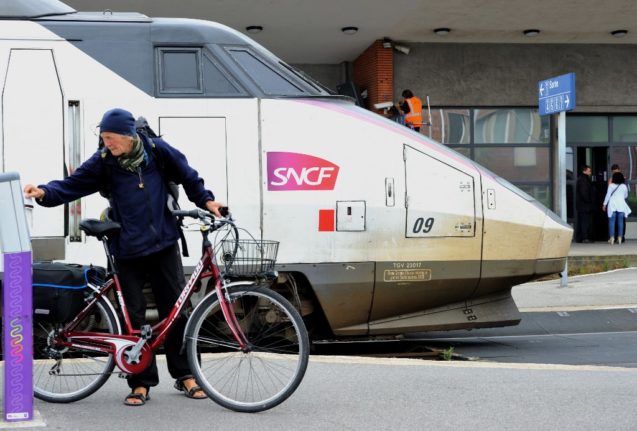The rules for carrying your bike onto a train in France depend on multiple factors, including the type of train you are using.
Generally speaking, recumbent bikes, tricycles, tandems, cargo bikes, longtail bikes and trailers are not allowed on any train lines.
The breakdown for regular bikes is as follows:
TGVs and Intercités
TGVs are high-speed trains that connect major cities and some large towns in France. The Intercités trains connect major towns not covered by the TGV network.
If you want to bring your bike, fully assembled, on either of these train services you must reserve a space for your bike at the same time as you buy your ticket online or at the station. This will typically incur a €10 charge. You must then store your bike on the dedicated racks on board the train.
If there is no option to reserve a bike space online, this means that either the train doesn’t provide a space for bikes or that all of the bike spaces have been reserved already. Some lines, such as Paris – Avignon TGV do not accept fully assembled bikes at all, which is why it is worth checking online first, via www.sncf-connect.com.
One solution is to bag up (housse) or box your bike, or use a folding bike, which doesn’t require you to reserve a space for it. This must be packed into a cover and stored in the baggage area onboard the train. The dimensions must not exceed 130cmx90cm. No specific reservation is required and it is generally free to carry a bike on this way.
However, when booking a journey on a line operated by OUIGO, there is a €5 charge even for bagged or folding bikes and you must reserve online.
TER
The TER network consists of regional train lines where you can bring your bike for free, provided you hang it on a designated rack or place it in the bike storage area. No special reservations are required but spaces in the bike areas are often limited and are available on a first-come, first-served basis, meaning that it is worth arriving a little early.
In most cases no reservation is required but it is worth checking the TER website first or asking at the station as there are notable exceptions, such as on the Paris-Dijon-Mâcon line for example.
There also some TER lines on which you can only bring a bike at certain times of day. On the Provence-Alpes-Côte d’Azur line for example, station controllers sometimes ban bikes at busy rush hour times such as 7am-9am and 16h30-18h30 Monday to Friday.
A regional breakdown of other such exceptions to bike transport onboard TER services is available here.
Rail transport in Paris
Bikes are banned on the Parisian metro service, as well as on bus and tramway services in the capital.
The notable exception is on line 1, where bikes can be transported on Sundays and bank holidays before 16h30. You should ask station staff to open the service gates for you to transport your bike through the station.
The RER and Transilien trains which connect Paris to its suburbs do allow for the transport of bikes, but not between 6h30-9h and 16h30-19h Monday to Friday. When using these trains, you must keep your bike in the designated section of the train and are advised to stay with it throughout your journey.
No special reservations are needed.
Eurostar
If you are travelling between London and Paris on the Eurostar, you can book a space for your bike by emailing [email protected]
This service is only available at between the following times:
- London to Paris 08h01 – 15h31
- Paris to London 11h13 – 18h13
Availability is usually limited to it is best to email well in advance. Reservations made more than 48 hours in advance of departure cost £45 each way, while those made less than 48 hours before cost £60 each way.
Any bikes you plan to transport this way must be disassembled and placed in a box or bag. They should be dropped off with Eurostar staff at the station in London or Paris and picked up on the other side.
If you are travelling from London to Lille, or vice versa, it is not possible to carry a regular adult bike onboard.
On any UK-France Eurostar service, you can carry a folding bike or a children’s bike for free – as long as it is no more than 85cm long and carried in a protective bag. These bikes will be considered as one item of luggage, when it comes to your luggage allowance.



 Please whitelist us to continue reading.
Please whitelist us to continue reading.
Member comments